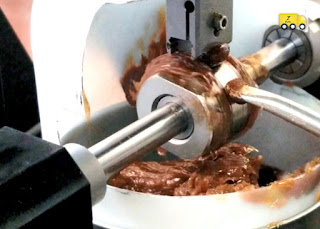Choosing the right grease thickener for your automobile
Selection of right grease is important for us but we should know what the right grease thickener is? We need to know the details of lubricant or grease which we used in our automobile. NLGI states that “the solid particles which are relatively uniformly dispersed to form the structure of lubricating grease in which the liquid is held by surface tension and other physical forces”.
Thickeners are of two types soaps and non-soaps. Non – soaps consist of two categories. The first group is that undergo a chemical reaction to form a thickener such as calcium sulphonate. Second is a dispersion of oil such as silica, carbon black and organo-clays.
A grease thickener can affect your grease’s operating temperature, load, speed and material capability. That is why it is important to select the best grease thickening system.
Thickeners are of two types soaps and non-soaps. Non – soaps consist of two categories. The first group is that undergo a chemical reaction to form a thickener such as calcium sulphonate. Second is a dispersion of oil such as silica, carbon black and organo-clays.
A grease thickener can affect your grease’s operating temperature, load, speed and material capability. That is why it is important to select the best grease thickening system.
Organic Soaps
There is a wide variety of grease thickener available in the market having different physical properties to check which soap is best. The reaction of the metallic alkali with monobasic organic acid results in simple soaps.
Lithium Soaps
These are very efficient grease thickeners. Lithium greases prepared from them have good lubricity, shear stability, thermal resistance, and relatively low oil separation. From history, automotive and industrial industries use lithium soaps.
Calcium Soaps
Greases made up of calcium soaps have greater water resistance over lithium soaps and also they have greater shear stability. But they do not have a thermal resistance.
Sodium Soaps
Sodium soaps have a high dropping point. They also don’t have good water resistance. Also, they provide good shear stability and lubricity. Sodium soaps are used in limited amount to operating conditions due to poor oxidative stability and high oil bleed.
Aluminium Soaps
Aluminium soaps have good water resistance and oxidation resistance. When these greases get too hot from bearing heated, they form stringy gels that cause sharp increases in torque and therefore additional work is required to turn a bearing. However, these greases have a very low thermal resistance but users limit its operating conditions to less than 80°C.
Mixed Soaps
Mixed soaps grease comes into existence just to overcome the shortcomings of simple and organic soaps greases. However, when calcium improves its water resistance, they use the combination of Lithium and calcium.
Complex Soaps
Lastly, it is complex soap greases which can form by reacting the alkali with the blend of monobasic acid and dibasic acid. These greases give you improved temperature resistance and can handle applications where there are short temperature excursions; higher is possible. The heat resistance of grease can be measured by a temperature sweep test using a controlled stress rheometer. In this test, a simple soap grease will lose its structure as the temperature approaches that of its dropping point. However, a good complex will have a significantly more stable structure and as the temperature approaches 300°C.


Thankyou this article helps me alot.
ReplyDeletecar lubrication